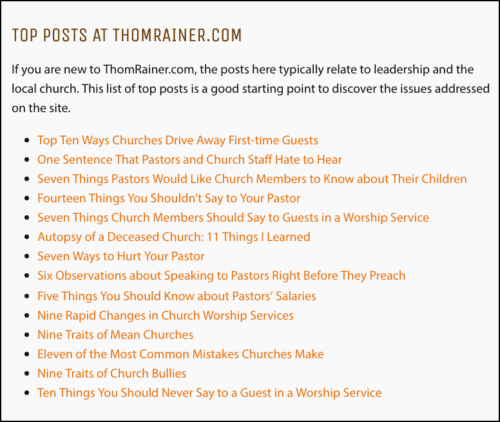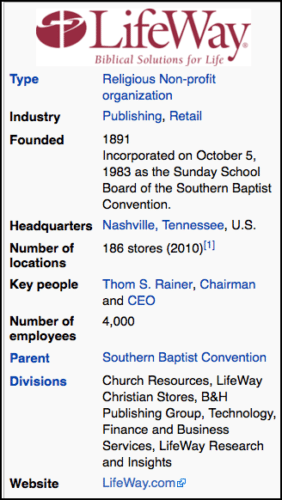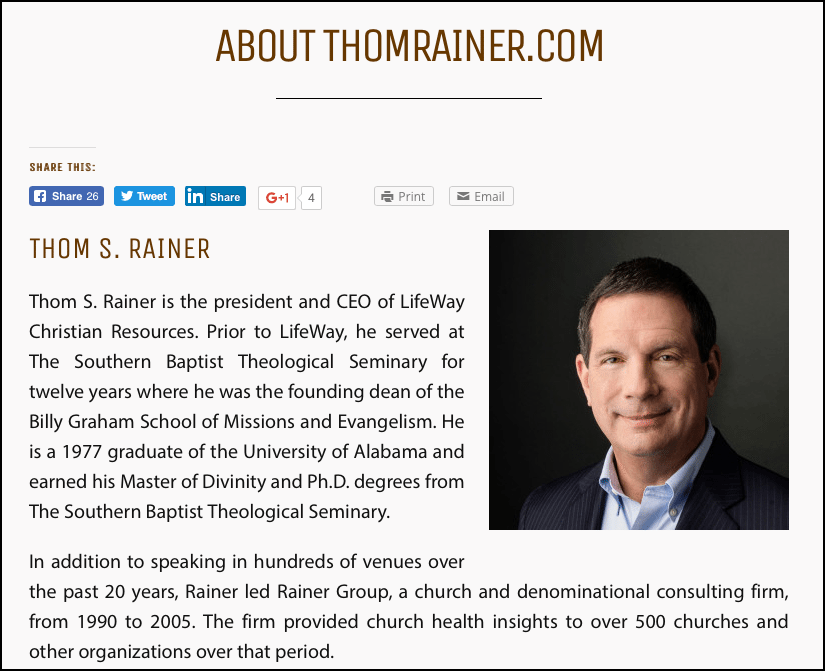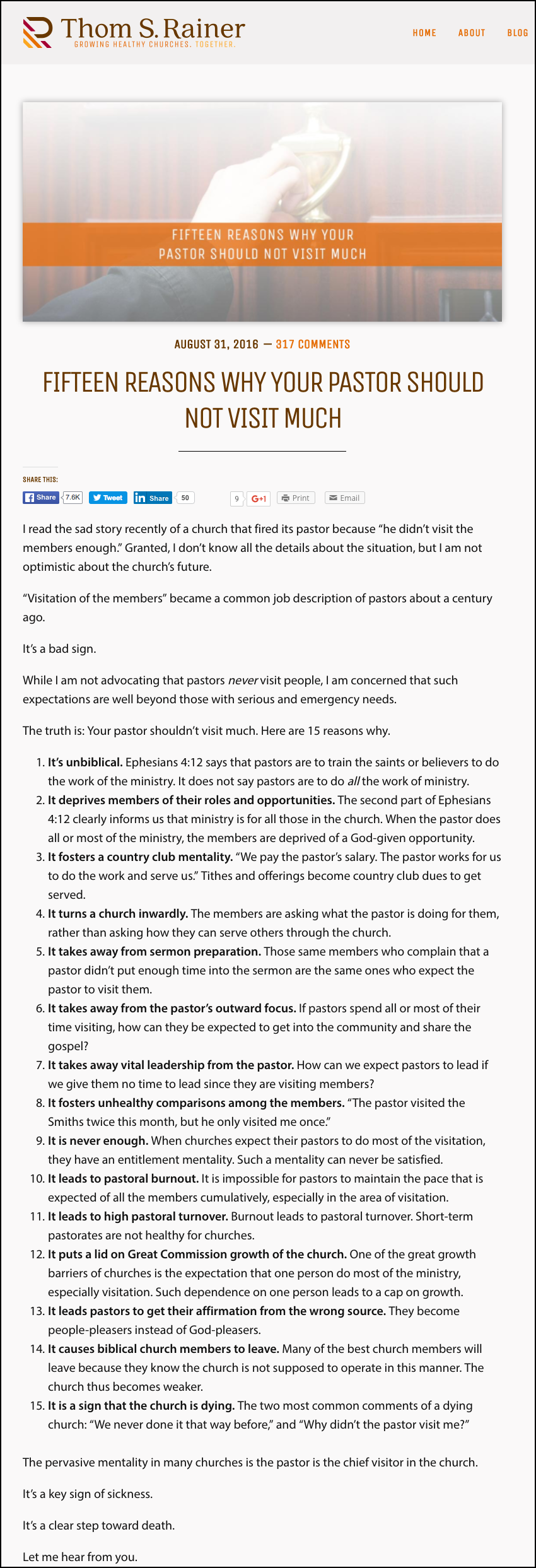

Have you noticed the penchant several of the Gospelly Boyz have with numbering their blog titles? I have often wondered why they do this. Perhaps they love arithmetic and just can’t get enough of numbers; perhaps they are linear thinkers; perhaps after years of writing three-point sermons, they are uncomfortable writing a free-flowing article devoid of any numerical bullet-points; perhaps they believe their target audience’s reading comprehension skills are so low that they need short, numbered paragraphs to enable them to retain what they read; perhaps they have found Campus Crusade’s 4 Spiritual Laws to be such an effective evangelism tool that they believe numbered blog articles will be similarly persuasive; or perhaps they are taught to do this at some class they take at Southern Baptist Theological Seminary. (This is purely conjecture on my part, but all three men named below have connections to SBTS.)



On August 8, 2013, pastor Ed Stetzer wrote a blog article in which he stated:
“At Grace Church, there are three things and ONLY three things that I do: I meet with the staff/apprentices, I preach about 70% of the time, and I lead a small group in my home.”
Stetzer went on to tell his church members that “I can’t do funerals, visits, phone calls, or meetings.”
The article caused quite a stir and The Wartburg Watch wrote a blog article in response, which garnered over 200 comments. (The Wartburg Watch routinely gets 300-500 comments on an article now, but three years ago 200+ comments were significant.) The Wartburg Watch article can be read here.
 Fast forward three years and Thom Rainer has followed Ed Stetzer’s lead with a similar article, but with a different slant. Stetzer wrote as a pastor, telling his congregation that he would not be doing funerals or visiting church members. (Although Stetzer is also employed by LifeWay.) Stetzer’s blunt comments may be understandable in that he was a bi-vocational pastor. Several individuals commented on The Wartburg Watch, including Wendy Alsup, a theologian I hold in high regard, that Stetzer is an honorable man and would never leave a church member in need uncared for.
Fast forward three years and Thom Rainer has followed Ed Stetzer’s lead with a similar article, but with a different slant. Stetzer wrote as a pastor, telling his congregation that he would not be doing funerals or visiting church members. (Although Stetzer is also employed by LifeWay.) Stetzer’s blunt comments may be understandable in that he was a bi-vocational pastor. Several individuals commented on The Wartburg Watch, including Wendy Alsup, a theologian I hold in high regard, that Stetzer is an honorable man and would never leave a church member in need uncared for.
Rainer is president and CEO of LifeWay Christian Resources. Lifeway is the book publisher for the Southern Baptist Denomination. He also authors a blog whose goal is “Growing healthy churches. Together.”
It appears that Rainer writes from the pastor’s perspective to a largely conservative, evangelical audience. He is able to say what many pastors would probably like to say but are unable to do so. He, therefore, seems to have many pastors also reading his blog.
I don’t personally know Thom Ranier, he is probably a very personable man, after all, you don’t get to be a Christian celebrity by ruffling too many feathers! (Notable exceptions are Martin Luther and Mark Driscoll. Driscoll’s celebrity status was short-lived and it is doubtful Martin Luther would have been a member of the Gospel Glitterati club were he living in the USA today. Which reminds me, has Carl Trueman ever been invited back as a conference speaker since he blasted the celebrity culture?)
Rainer earns my praise for regularly writing a blog and then taking the time to interact with those who submit comments. This is rare among men of his stature. He doesn’t exhibit much patience with those who disagree with him, but then few do.

Rainer recently wrote what I consider to be an outrageous article on why pastors shouldn’t do visitation (much). He had to throw the “much” in there or risk being labeled as totally cold-hearted and aloof. He states right off that “I am not advocating never visit people, I am concerned that such expectations are well beyond those with serious and emergency needs.” My interpretation of Rainer’s thoughts is that a pastor will visit you if you are on your death-bed or a family member was killed in a car accident or some such tragedy, but if you are expecting him to stop by for tea and crumpets and check on the state of your soul, forget it. Rainer remarks, disparagingly, that visitation of members was a “common job description of pastors about a century ago.” (Who thinks the state of Christianity in the USA today is better than a century ago? But I digress.) He then goes on to say in point #1 that, based on Ephesians 4:12, visitation by your pastor is unbiblical! REALLY? That’s all Dr. Rainer has? A Master of Divinity and a Ph.D. from The Southern Baptist Theological Seminary and Dr. Rainer’s dismissal of pastor’s participating in membership visitation consists of exegesis of exactly one verse of the bible? And that exegesis consists of “pastors are to train the saints or believers to do the work of the ministry. It does not say pastors are to do all the work of ministry.”
My questioning of why anyone would want to attend SBTS are only strengthened by this shoddy work, but I must admit I am starting to understand where John Folmar, the senior pastor of United Christian Church of Dubai and graduate of SBTS, may have picked up his work ethic. Folmar rarely does visitation and in the calendar year of 2013 he preached at exactly half of the Friday morning services. (Friday is the day of worship in the UAE.)
But I am getting ahead of myself. Go ahead and read through the fifteen reasons Dr. Thom Rainer lists in his blog article below which he believes support his view that pastors “should not visit much” and then I will comment on a few more below.

Here, briefly are my comments on Dr. Rainer’s points.
- See my comments above.
-
A pastor engaging in visitation does not deprive members of their roles and opportunities for ministry. Many times pastors visit members while accompanied by other members and many times members will visit others in addition to the pastoral visit.
-
While I would not deny some members may use the “country club mentality” to avoid engaging in works of charity, this is generally not the mindset of an individual who has experienced the love, grace and mercy of Jesus Christ.
-
I consider visitation to be part of a pastor’s job. I also consider preaching to be part of a pastor’s job. When a pastor engages in these activities it doesn’t make me ask what the pastor is doing for me. On the other hand, if he is not fulfilling the duties he is being paid for I would want to know why not.
-
It’s not an either/or scenario. I have seen studies on sermon preparation time and as I recall the average was about 15-20 hours per week. I have documented cases where C.J. Mahaney runs out the same sermon numerous times. The same with Wayne Grudem, the same with Mack Stiles, and I suspect many other’s do the same.
-
First priority of the pastor should be the people of his church. Now Dr. Rainer is saying that if he engages in visitation he will not be able to engage in evangelism. But if the pastor engages in evangelism is he not guilty of point #2 – depriving his members of opportunities for ministry? I think that the Holy Spirit is sovereign in evangelism and will bring people into the lives of both the pastor and individual members.
-
This point is bogus. A pastor leads by example. If I see him ministering to people, loving people by taking time to visit them, it speaks to me much louder than words on Sunday morning. This reminds me Luke 18:15-17.
-
Does this ever happen? I suppose there is such displays of immaturity by a small amount of church members, but these people will find fault with whatever happens.
-
This doesn’t make sense. A pastor with a lick of common sense would realize he only has “X” amount of hours in a week. Take a basic time managment course and schedule in items such as sermon prep, visitation, meetings, and whatever other duties are involved in the life of a pastor. If we look to please God instead of man this may involve saying no to some things. Make realistic plans for your time. Never having been a pastor, I have no idea what the job entails, but surely some time can be found to visit people. Church size and staff size obviously must factor into this. I realize a lone pastor of a church of 200 may be more pressed than a Sovereign Grace church plant in Louisville with a staff of five pastors for 100 members. I believe many church members are just as pressed for time as pastors, many even more so. I recall while attending a Sovereign Grace church in Gilbert, Arizona, I was working six day weeks, rotating shifts as an air traffic controller. I attended church on Sunday mornings. I arrived early to help with parking lot duties, church set-up or greeting. I helped with Alpha courses. I attended care group. (One of the assistant pastors actually chewed me out for missing care group meetings and suggested if I wasn’t going to attend regularly I should find a new church. Soon thereafter I took his advice, but he was completely unreceptive to my suggestion of having different times and days for care groups to meet.) I was also frequently helping friends in the care group move. Oh, and then we were frequently reminded from the pulpit of the importance of having a “date night” with our wife!
-
See 9 above.
-
I would like to see some studies backing up the claim that visitation leads to pastor burnout. I agree short-term pastorates are not healthy for churches but the reasons I have personally witnessed pastors leaving for are better pay at larger churches, scandals, and causing much dissension and rapid loss of large numbers of members by attempting to drive a church into Calvinism and 9Marx beliefs. The pastor succeeded in driving away 70% of the members and then, amazingly, felt called to another church!
-
Again, I see this as a faulty argument. A pastor is expected to participate in visitation, but this doesn’t mean he is the only one who visits members. Similarly, a pastor is expected to participate in evangelism, but so are all Christians.
-
See 9 above.
-
I would like to see some factual studies to back up the claim that many of the best church members are leaving because the pastor is visiting church members. In a Pew Research study I recently viewed of why people have left church it stated that “One-in-five express an opposition to organized religion in general. This share includes some who do not like the hierarchical nature of religious groups, several people who think religion is too much like a business and others who mention clergy sexual abuse scandals as reasons for their stance.” Surprisingly, nobody mentioned that they quit church because, golly gee, that pastor just visited the church members too much!
-
Again, I would like to see some factual evidence that back up this claim. A sign of a dying church is if a member asks “why didn’t a pastor visit me?” Are you serious? Maybe the reason the church is dying is because the pastor never visits anyone. I know an elderly man in Nampa, Idaho, who has attended a fairly large Nazarene church for 20 years. This man is suffering from cancer and the beginning stages of Alzheimer’s disease. He has received no visits from any of the pastors. One saintly family routinely invite him to their home for dinner. Jehovah’s Witness members are routinely visiting him and leaving their literature. Perhaps the Nazarene pastors subscribe to Dr. Rainer’s views. All I can say is when I attend my father’s funeral I will be one of those people aksing the pastor why he never paid my father a visit.
“The Christian minister out of the pulpit should be a sociable man. He is not sent into the world to be a hermit, or a monk of La Trappe. It is not his vocation to stand on a pillar all day, above his fellow-men, like that hare-brained Simon Stylites of olden time… Salt is of no use in the box; it must be rubbed into the meat; and our personal influence must penetrate and season society. Keep aloof from others, and how can you benefit them? Our Master went to a wedding, and ate bread with publicans and sinners, and yet was far more pure than those sanctimonious Pharisees, whose glory was that they were separate from their fellow-men. Some ministers need to be told that they are of the same species of their hearers. It is a remarkable fact, but we may as well state it, that bishops, canons, archdeacons, prebendaries, rural deans, rectors, vicars and even archbishops, are only men after all; and God has not railed off a holy corner of the earth to serve as a chancel for them, to abide therein by themselves.
A man who is to do much with men must love them, and feel at home with them. An individual who has no geniality about him had better be an undertaker, and bury the dead, for he will never succeed in influencing the living.”
C. H. Spurgeon, “Letters to my Students,” Book I, pages 182-83.
Let me now present an opposing view to that of Dr. Rainer’s. I trust you will see the wisdom of Baxter’s view of visitation.
The pastor and visitation: Richard Baxter’s model
Three hundred fifty years after it was written, The Reformed Pastor by the English Puritan Richard Baxter, remains one of the most helpful works available on pastoral ministry. In these times when there is so much confusion over pastoral roles and expectations, Baxter’s work can illuminate the goals and methods of ministry. The book is an extended treatment of Acts 20:28: “Take heed therefore unto yourselves, and to all the flock, over which the Holy Ghost hath made you overseers, to feed the church of God, which he hath purchased with his own blood.”
Ministry more than a “job”
Baxter lamented a situation in his day that is similar to our own. Many, he said, treat the ministry as “but a trade to live by.” However, there is a key difference between pastoral ministry and every other occupation. Pastors are called to be shepherds of the church of God (Acts 20:28). They are not called to “do a job” or even to carry out “professional responsibilities,” but are summoned into a living, personal relationship with a community of people on behalf of Jesus Christ.
Pastoral ministry is, in essence, a personal relationship. We cannot put sharp boundaries around authentic personal relationships, because they are grounded in the communion of whole personalities that cannot be fragmented into “roles” or “functions.” In a marriage it is impossible to separate the “roles” of friend, lover, partner, adviser, critic, or cheerleader that are bundled together into the designation “spouse.” Likewise, pastoral ministry defies the categories and classifications of the modern “job description” that tends to reflect the alien ethos of business or government more than the values of the kingdom of Christ. The “job” of the pastor is determined by our calling to care for people in the name of the Good Shepherd. Baxter understood that ministers cannot think about what they do apart from who they are and whose they are.
Integration through visitation
Baxter’s holistic understanding of ministry with reference to the last part of The Reformed Pastor is illustrated when he deals with “personal catechizing and instructing,” or pastoral visitation. Visiting, Baxter argued, is the principle method of bringing about personal “reformation” in the parish. (This is the sense in which he talks about the “reformed” pastor. “Reformed” does not refer narrowly to a particular confession but should be under stood in the sense of “re-formed” remade, reshaped, renewed.) Baxter combined visitation with instruction into an overall strategy of pastoral care. He insisted that every pastor should devote a large portion of the week to visiting people in their homes, following the apostles’ example (Acts 5:42) by instructing them on the “principles of religion” and testing their knowledge.
Even in the seventeenth century, it seems, pastors resisted going out and visiting their flocks. “We teach our people in public [on Sundays],” they argued, “how then are we bound to teach them [individually] besides?” Baxter tried to get pastors to stop thinking of visitation as an onerous duty and to consider it an advantage to both themselves and their people.
The people benefit when the pastor combines visiting with personal instruction, because one-on-one encounters lead to deeper intimacy and effectiveness. Baxter describes the sort of person with whom every pastor is familiar: the faithful pew-sitter who, after listening to decades of sermons, still does not know the difference between Genesis and Revelation, let alone the more subtle points of Christian doctrine. More can be accomplished with such a person, he argues, in 30 minutes of private conversation than in 10 years of preaching, because the communication of the gospel is a profoundly personal event. The pastor mediates a personal Savior to his or her flock, person-to-person. Each person tends to respond to sermons in his or her own way, and often they do not hear accurately what the preacher has said. Personal conversation can deal with the individual’s own peculiar needs and correct misunderstandings.
Regular personal instruction benefits the pastor as well as the congregation. People get to know a pastor who visits and can cooperate more effectively in the redemptive work of the church.
Visiting strengthens preaching, because it helps pastors know what to preach. They come to know their people’s struggles and fears. This knowledge enables them to preach with greater power. Baxter expresses it eloquently: “By means of personal instruction, we shall come to be better acquainted with each person’s spiritual state, and so the better know how to watch over them. We shall know better how to preach to them, and carry ourselves to them, when we know their temper…. We shall know better how to lament for them, and to rejoice with them, and to pray for them.”
Knowledge of Scripture combined with intentional visitation are the practical foundations of evangelical preaching: “as the physician’s work is half done when he understands the disease, so, when you are well acquainted with your people’s case, you will know what to preach on” (page 228). Indeed, Baxter regarded personal instruction as a form of preaching. “Surely,” he wrote, “a man may as truly preach to one, as to a thousand” (page 228).
Visitation also engages the pastor as a healer. Baxter uses the images of the “shepherd” and the “physician” to describe the minister. We are called to bind up the brokenhearted and to heal their wounds with the medicine of the gospel. Unlike other helpers, pastors can actually go out to seek and save the lost. We have what Paul Pruyser has called “the pastoral right of initiative and access.” Once people have invited us in, we discover how many broken and breaking hearts there are out there. It never ceases to amaze me how people will open their hearts to their pastor during the course of the visit, confiding things they have not told even their closest friends or family. We can use such opportunities to teach them of the healing power of the Savior.
Several pastoral roles preacher, teacher, healer coalesce in the act of visitation. Baxter did not view visitation as merely one of the “tasks” that keep the pastor busy. It is a method or a means by which the pastor can more effectively be who he or she is called to be. According to Thomas Oden, pastoral visitation “is one way of reflecting the glory of God’s own visitation of humanity in Christ, seeking the lost, redeeming sin, mending pain.”
Conditions are very different today from what they were in the 1600s. Consequently, it is not easy for pastors to do what Richard Baxter did: spend all day Monday and Tuesday interviewing families. Practically speaking, people are too scattered today, both in terms of geography and of lifestyle. However, Baxter’s central principle that personal visitation strengthens the total pastoral ministry can still be adapted profitably to the contemporary situation. This is especially true in smaller communities where the neighborhood church still exists.
No matter what the difficulties, it is essential that we pay attention to Baxter’s model of the active pastor “going out,” “seeking,” rather than passively waiting for people to come to church, to join Bible study, to make appointments.
Using pastoral visitation to teach
There are many occasions when visiting and teaching can be combined.
First, the pastor has certain “rites of passage” which provide excellent teaching opportunities. Visiting with a young couple planning to get married, with parents after the birth of a child, with bereaved families these are all opportunities for deepening Christian understanding.
Marriage appointments can be a time to instruct couples about the uniqueness of the Christian concept of love in contrast to popular romantic notions. The pastor can relate the unconditional love promised in the marriage vows to the unconditional love of Christ for His people, and actually invite couples to a deeper Christian commitment.
Baptisms or dedications can be opportunities to teach about God’s covenant faithfulness and His promise of a future. Pastors can bring young parents into touch with Jesus’ words about childlike faith.
Funeral preparations not only serve a comforting purpose, but are moments for teaching about the gospel of resurrection.
Second, pastors can teach during times of crisis. The death of a loved one, the breakdown of a marriage, or the loss of a job plunge people into emotional, social and spiritual crises. Particularly in smaller communities, with limited mental health resources, the pastor is still most likely to receive the first cry for help when lives begin to crumble.” Pastors continue to be on the very front lines in dealing with individuals and families in crisis.
Acute loss is often accompanied by feelings of guilt. “What did I do to cause this to happen? What could I have done to prevent it from happening?” People are brought face-to-face with issues of sin, failure, and injustice at such times. Visitation at times of crisis affords the pastor the opportunity to bring people into touch with the realities of grace, forgiveness, and hope that lie at the heart of the gospel.
Visits during passages and crises are special opportunities for pastoral instruction. It is not necessary to wait for these exceptional moments. Regular visitation in people’s homes should have an implicit teaching or proclaiming component. It is not always possible or desirable to have an overtly theological discussion. In most cases, it is possible to apply Christian faith and teaching in some way to the concrete circumstances of life.
There are many excellent resources that can guide and encourage the present-day pastor. I have found none more challenging and rewarding than Richard Baxter’s The Reformed Pastor.